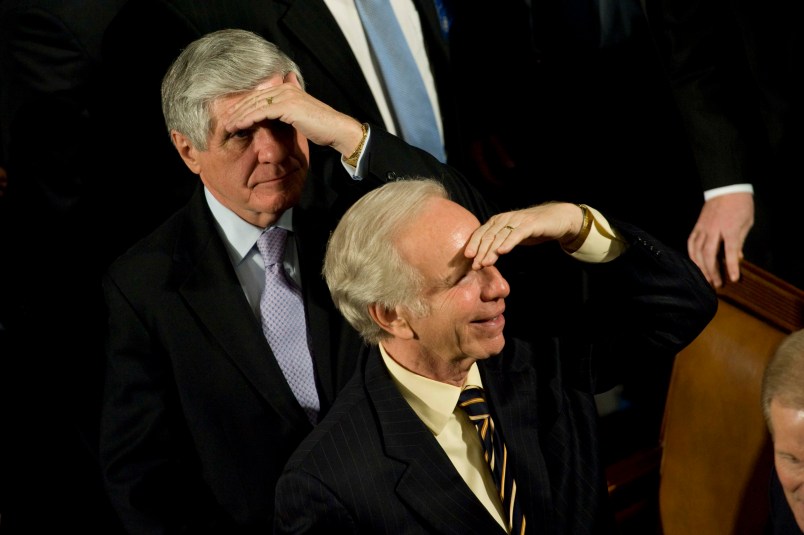Two crucial questions hang over the Senate. Will it pass Democrat-only health care reforms? And can a public option survive the whims of the so-called budget reconciliation process?
If the answer to both questions is yes, then the public option could survive in the stasis-oriented upper chamber. But if the answer to the second question is “no,” then the Democrats will a lot of whipping to do. Below are the key hold outs.
One thing that’s striking about this the list is how reluctant senators are to take a firm position. Compare that to the situation in the House, where dozens of liberals have vowed that they’ll oppose any health care bill without a public option, and it casts some doubt on the conventional wisdom that health care reform will pass without a public option after the Congressional Progressive Caucus caves to pressure from Democratic leadership and conservatives in their own party.
The Waverers
Sen. Max Baucus (D-MT) has perhaps more power than any single person in Congress to shape the direction health care reform will take. And though he tells his supporters in Montana that he “wants a public option,” he’s also been at the helm of negotiations over legislation that will almost certainly not include a public option.
By all accounts, Sen. Tom Carper (D-DE) would support a health care bill with a public option–but he’s not about to make a big fuss if the final legislation doesn’t create one.
Sen. Jon Tester (D-MT), like his Delaware colleague, isn’t a public option foe–but nor is he a particularly staunch ally. “I don’t need it either way,” Tester told the Associated Press today. “I could either support it or not support it. It’s all in the design.”
Sen. Mark Warner (D-VA) isn’t particularly eager to see a public option–but like so many Senate centrists, he doesn’t rule it out. However, Warner, like Tester, enjoyed a lot of electoral support from the progressive grassroots, and so tends to obscure the issue when asked whether he’d support a government run insurance plan.
Late update: A Warner spokesman tells me that the senator would vote for a bill with a public option in it, as long as the reform package lowers costs.
Sen. Blanche Lincoln (D-AR) has a problem. Though a well known pol in Arkansas, she’s up for re-election next year and, according to recent polls, she’s running in a statistical dead heat with two relatively unknown Republicans. So though she’s articulated an openness to a public option in the past, she’s also suggested she might just vote against the whole package.
Sen. Mark Pryor (D-AR), unlike his Arkansas colleague, is not up for re-election next year, and so says, “A public option plan is something that is still on the table and something [I] could support, but it should be designed in a way that increases and does not eliminate competition.”
Sen. Evan Bayh (D-IN) hasn’t said much about the public option lately. Several months ago he insisted he was “agnostic” about it. But progressives are concerned that he’ll be influenced by his wife, who sits on the board of Wellpoint–one of the country’s largest insurance companies.
The Mysteries
Nobody really knows where Sen. Bill Nelson (D-FL) will fall on the question of the public option. According to the website Open Left, he told them he’s a maybe. But that’s not good enough for the DNC’s political arm Organizing for America, which recently held events outside his offices around the state of Florida.
Like the other Nelson, Sen. Ben Nelson (D-NE) is an unknown quantity. He has voiced both opposition and support for the public option and has by and large avoided the question since the Senate Finance Commitee began moving away from endorsing one.
Sen. Mark Begich (D-AK): An unknown quantity who’s been about as liberal as you can expect for a Democrat from Alaska.
Sen. Kent Conrad (D-ND) is like bad cop to Baucus’ good cop. He refuses to announce a personal position on the public option because he views it as “moot”–a measure that doesn’t stand a chance in the Senate. So though nobody knows for certain how he’d vote–procedurally or otherwise–on a bill or a conference report with a public option in it, he’s been the loudest voice in the Senate in calling for a system of privately run, non-profit health care co-operatives–a compromise House progressives regard as a non-starter.
The Haters
On the day the country mourned the death of health reform giant Ted Kennedy, Sen. Mary Landrieu (D-LA) said that there are very few circumstances under which she could support a public option.
Sen. Joe Lieberman (I-CT) says he’s a no.










